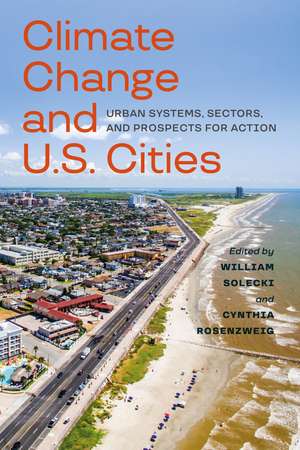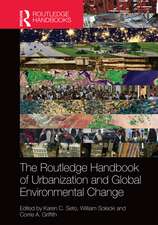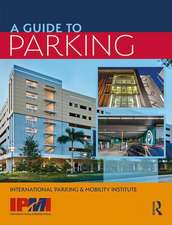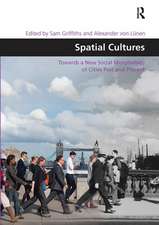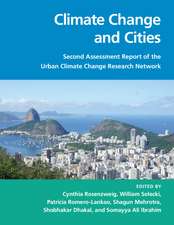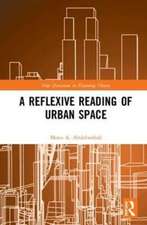Climate Change and U.S. Cities: Urban Systems, Sectors, and Prospects for Action: NCA Regional Input Reports
Autor William D. Solecki, Cynthia Rosenzweigen Limba Engleză Paperback – 8 feb 2022
Prepared as a follow-up to the Fourth National Climate Assessment (NCA), Climate Change and U.S. Cities documents the current understanding of existing and future climate risk for U.S. cities, urban systems, and the residents that depend on them. Beginning with an examination of the existing science since 2012, chapters develop connections between existing and emerging climate risk, adaptation planning, and the role of networks and organizations in facilitating climate action in cities. From studies revealing disaster vulnerability among low-income populations to the development of key indicators for tracking climate change, this is an essential, foundational analysis. Importantly, the assessment puts a critical emphasis on the cross-cutting factors of economics, equity, and governance.
Urban stakeholders and decision makers will come away with a full picture of existing climate risks and a set of conclusions and recommendations for action. Many cities in the United States still have not yet planned for climate change and the costs of inaction are great. With bold analysis, Climate Change and U.S. Cities reveals the need for action and the tools that cities must harness to effect decisive, meaningful change.
Preț: 275.81 lei
Nou
Puncte Express: 414
Preț estimativ în valută:
52.77€ • 55.25$ • 43.67£
52.77€ • 55.25$ • 43.67£
Carte disponibilă
Livrare economică 17-31 martie
Livrare express 28 februarie-06 martie pentru 34.19 lei
Preluare comenzi: 021 569.72.76
Specificații
ISBN-13: 9781610919784
ISBN-10: 1610919785
Pagini: 328
Ilustrații: 15 figures
Dimensiuni: 152 x 229 x 15 mm
Greutate: 0.43 kg
Editura: Island Press
Colecția NCA Regional Input Reports
Seria NCA Regional Input Reports
ISBN-10: 1610919785
Pagini: 328
Ilustrații: 15 figures
Dimensiuni: 152 x 229 x 15 mm
Greutate: 0.43 kg
Editura: Island Press
Colecția NCA Regional Input Reports
Seria NCA Regional Input Reports
Notă biografică
William Solecki is a Professor of Geography at Hunter College, CUNY, and a founding member of both the Urban Climate Change Research Network and the International Human Dimensions Programme’s Urbanization and Global Environmental Change Project. Dr. Solecki is currently a lead author of the IPCC Sixth Assessment.
Cynthia Rosenzweig is a Senior Research Scientist at the NASA Goddard Institute for Space Studies, where she heads the Climate Impacts Group. She is a Professor at Barnard College and a Senior Research Scientist at The Earth Institute at Columbia University.
Cynthia Rosenzweig is a Senior Research Scientist at the NASA Goddard Institute for Space Studies, where she heads the Climate Impacts Group. She is a Professor at Barnard College and a Senior Research Scientist at The Earth Institute at Columbia University.
Cuprins
Chapter 1. Introduction: Cities and Climate Change Connections
William Solecki and Cynthia Rosenzweig
Chapter 2. Urban Systems and Climate Change in Context
Nancy B. Grimm, Dale Quattrochi, and Christopher Clark
Chapter 3. Urban Infrastructure Systems and Services: Vulnerabilities and Impacts
Rae Zimmerman and Adam Freed
Chapter 4. Urban Climate Adaptation Planning, Governance, and Economics
Susan Julius, Ira Feldman, and JoAnn Carmin
Chapter 5. Sustained Urban Climate Assessment
Cynthia Rosenzweig, Danielle Peters, and Reginald Blake
Chapter 6. Conclusions and Recommendations: Prospects for Action
Cynthia Rosenzweig and William Solecki
William Solecki and Cynthia Rosenzweig
Chapter 2. Urban Systems and Climate Change in Context
Nancy B. Grimm, Dale Quattrochi, and Christopher Clark
Chapter 3. Urban Infrastructure Systems and Services: Vulnerabilities and Impacts
Rae Zimmerman and Adam Freed
Chapter 4. Urban Climate Adaptation Planning, Governance, and Economics
Susan Julius, Ira Feldman, and JoAnn Carmin
Chapter 5. Sustained Urban Climate Assessment
Cynthia Rosenzweig, Danielle Peters, and Reginald Blake
Chapter 6. Conclusions and Recommendations: Prospects for Action
Cynthia Rosenzweig and William Solecki
Descriere
From roads to clean water systems, the built infrastructure sustaining urban populations is increasingly vulnerable to climate. Understanding the dilemma and identifying a path forward is particularly important as cities are significant agents of climate action.
A follow-up to the Fourth National Climate Assessment (NCA), Climate Change and U.S. Cities documents the current and future climate risk for U.S. cities, urban systems, and their residents. It is an examination of research findings since early 2012, with a critical emphasis on the cross-cutting factors of economics, equity, and governance.
Urban stakeholders and decision makers will gain an understanding of climate risks and a set of conclusions and recommendations for action. Climate Change and U.S. Cities boldly lays out the tools that cities must harness to effect decisive, meaningful change.
A follow-up to the Fourth National Climate Assessment (NCA), Climate Change and U.S. Cities documents the current and future climate risk for U.S. cities, urban systems, and their residents. It is an examination of research findings since early 2012, with a critical emphasis on the cross-cutting factors of economics, equity, and governance.
Urban stakeholders and decision makers will gain an understanding of climate risks and a set of conclusions and recommendations for action. Climate Change and U.S. Cities boldly lays out the tools that cities must harness to effect decisive, meaningful change.
